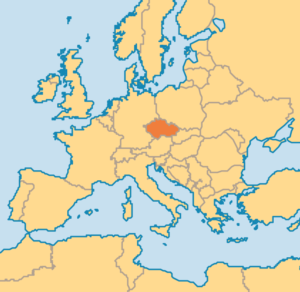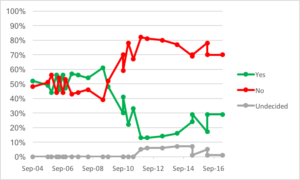The Czech Republic
The Czech Republic maintains a unique geopolitical location in the European Union. Located in eastern Central Europe, the Czech Republic consists of 78,866 square kilometers and a population of around 10.5 million people. The Czech Republic is a relatively new country. Czechoslovakia was formed in 1918  with the collapse of the Austro-Hungarian in the wake of World War I. Shortly after the country’s inception, Germany occupied it during the World War II. After being liberated by the Soviets, Czechoslovakia evolved into a one-party, Communist state via influence from the Soviet Union in 1948. However, the Velvet Revolution in 1989 occurred which expelled Soviet occupation from Czechoslovakia. Three years later in 1993, Czech and Slovakian bureaucrats peacefully voted on the dissolution of Czechoslovakia into the two distinct countries the Czech Republic and Slovakia. In 2004, the Czech Republic joined the European Union; however, they are not a part of the Eurozone.
with the collapse of the Austro-Hungarian in the wake of World War I. Shortly after the country’s inception, Germany occupied it during the World War II. After being liberated by the Soviets, Czechoslovakia evolved into a one-party, Communist state via influence from the Soviet Union in 1948. However, the Velvet Revolution in 1989 occurred which expelled Soviet occupation from Czechoslovakia. Three years later in 1993, Czech and Slovakian bureaucrats peacefully voted on the dissolution of Czechoslovakia into the two distinct countries the Czech Republic and Slovakia. In 2004, the Czech Republic joined the European Union; however, they are not a part of the Eurozone.
The Czech Republic is one of nine countries that do not use the euro; rather, it uses the Czech koruna. This lies in the fact that a provision outlined in the Treaty of Ascension, the document regulating the terms for which the Czech Republic would join the European Union, requires the Czech Republic to meet the Euro convergence criteria. The Euro convergence criteria is as follows:
- The budget deficit cannot exceed 3% of GDP
- Public debt cannot exceed 60% of GDP
- Member states must join European Exchange Rate Mechanism (ERM) to stabilize rates
- Inflation must exceed 1.5% above the average of the three economies with the lowest inflation
- Interest rates must not be more than 2% higher than the three lowest inflation member states
The Czech Republic is not able to join because two of the criteria are not met. The first is that the Czech
Republic has not joined the ERM, and according to current Prime Minister Andrej Babiš they do not have any plans to enroll. The second criteria the Czech Republic fails to meet is that the Czech legislature, given the Czech national sovereignty, must initiate the enactment of the Convergence Treaty because the EU has no power to force them to do so. With the recent Euro-crisis and its devaluation, many Czechs feel that their country would be better served by the koruna rather than the euro.
Though the Czech Republic does not participate in the Eurozone, it has a prosperous economy nonetheless. The GDP for 2016 was 7,708,005 Kč, which is equivalent to €302,261, which places it as the 49th largest economy on a global scale and 17th largest economy in the EU.
Because of the period of uncertainty with regards to the euro in the times post-euro-crisis in addition to the fact that the Czech economy is doing exceedingly well without the euro, most economic forecasts predict that the Czech Republic will not join the Eurozone in the near future.
